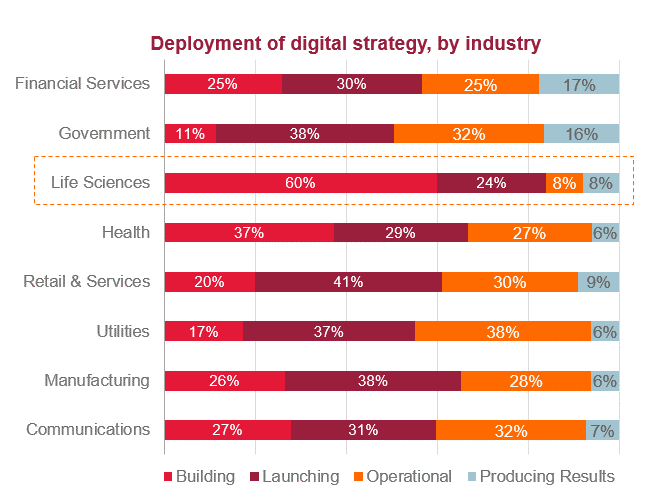Black swan events such as the COVID-19 pandemic leave business with little time to think. Actions must come fast. Products and services must continue to meet customer demand in an environment of social distancing and travel bans.
As life sciences organizations continue to play a major role in responding to the pandemic crisis, with great commitment and compassion, they will find more reasons speed up their digital transformation efforts with an eye to immediate and future preparedness—and even reinvention.
Some critical practices they currently are seeking to improve in with digital technology in this response phase include:
- Remote working
- Customer engagement
- Virtual training, conferences and clinical trials
- Collaboration and data sharing
- Supply chain management
Prior to the pandemic, many life sciences organizations appeared to be taking a more opportunistic approach to adopting digital technology. In the 2019 CGI Client Global Insights, only 16% of life sciences executives interviewed said they are producing results or are at the operational stage of their digital strategy—a noticeably lower percentage than other sectors.
While being opportunistic can be a great attribute, those who wait to see the benefits of new technologies achieved by early adopters will be slower to learn and evolve. A “wait and see” approach has become less tenable today.
The urgency for transformation
The current crisis will be a catalyst for companies to rethink how they innovate and do business going forward. Meanwhile, those who already are well on their digital journeys will speed up their plans and maintain an edge over their competitors. They also will be well poised to weather future economic uncertainty.
While the life sciences sector has embraced remote working to some extent, the pandemic will further encourage companies to pursue digital solutions for:
- Manufacturing and supply chain disruption
- Face-to-face sales rep-HCP interaction
- Clinical trials continuity
- Training (sales and product)
- Marketing, sales and scientific conferences
- Remote work collaboration
While some of these areas might have been low priority candidates for digital initiatives in the past, many leaders across the industry are recognizing the time to reinvent is now.
Taking action to respond and rebound
I believe the crisis also has helped to clarify five critical areas where life sciences companies must invest as they continue to respond and rebound. These are:
- Artificial intelligence/prescriptive analytics: building risk models for real-time decision making
- Digital engagement: implementing seamless omnichannel experiences
- Collaboration: defining the protocols for remote working environments where teams can still feel connected
- Business processes: identifying gaps, current dependencies and business criticality
- Commercialization: reinventing the marketing and sales organization for a balance of messaging and healthcare professionals interaction (face to face and virtual)
This forced change can be a good opportunity for all leaders to take stock of what a new business model could look like using digital tools and technology to keep the business connected and productive. They can use these pivots as the jumping-off platform to speed their digital reinvention for the future. We look forward to helping them advance on their digital journeys.





